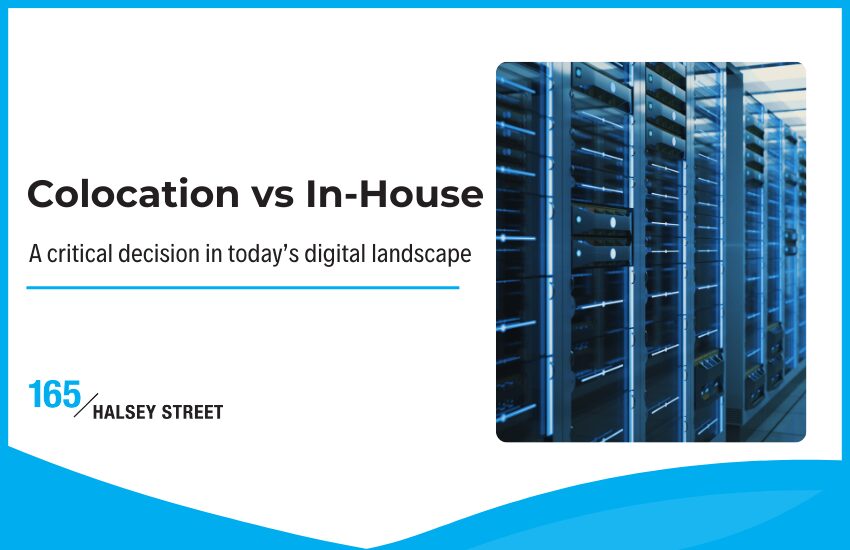Choosing between colocation and in-house data centers is a critical decision in today’s digital world. Both offer distinct advantages but determining which is best depends on business suitability. The goal is discovering what solution aligns with your company’s needs, budget and future plans. We can help you achieve success by informing you about colocation vs. in-house data centers.
What Is a Colocation Data Center?
A colocation data center allows businesses to rent space within a third-party facility to house their servers and IT infrastructure. Businesses retain control over their equipment but the colocation provider manages power, cooling and physical security, delivering the infrastructure to keep your operations running smoothly.
This model is particularly attractive for companies that require high-performance infrastructure but lack the resources or desire to build and maintain a dedicated data center.
Benefits of Colocation for Your Business
- Cost-Efficiency: By choosing colocation, your business can avoid the significant capital expenses associated with building an in-house facility. Colocation spreads out the costs of essential services like power, cooling and security across multiple tenants.
- Scalability: Colocation allows you to quickly expand or reduce server capacity in response to changing business needs. This flexibility makes it easier to adapt your infrastructure to support business growth or temporary changes in demand.
- Expert Support: Many colocation facilities provide 24/7 technical support, giving businesses access to trained professionals who can monitor systems, handle emergencies, and ensure smooth operations without the need for an in-house team.
- Security and Compliance: With colocation, businesses can rely on enhanced security measures, such as multi-layered physical security and compliance with industry standards (e.g., SOC 2, ISO certifications). These facilities often offer a level of protection that would be challenging and costly to replicate in-house.
- Geographic Redundancy: Colocation data centers are often located in well-suited geographic areas for optimal network performance and disaster recovery, providing redundancy and security for your data.
What Is an In-House Data Center?
An in-house data center is a facility that your business owns and operates internally. This option gives you full control over your IT infrastructure, from the physical environment to the equipment you use. While this autonomy is appealing for businesses with specific needs, it comes with significant costs and challenges.
Challenges of In-House Data Centers
- High Initial and Ongoing Costs: Building an in-house data center requires a substantial upfront investment in construction, equipment and utilities. Additionally, ongoing costs for maintenance, power, and cooling can accumulate over time.
- Limited Scalability: Expanding an in-house data center can be a slow and expensive process, as it often involves purchasing additional equipment and upgrading the physical facility to support growth.
- Maintenance and Staffing: Your IT team will be responsible for all day-to-day operations, including monitoring systems, managing hardware, and ensuring data center compliance. This can place a significant burden on your internal resources.
- Disaster Recovery Risks: Without proper redundancy measures, in-house data centers may be more vulnerable to natural disasters, power outages or security breaches. Implementing disaster recovery strategies can be costly and complex.
Business Suitability: Which Option Fits Your Needs?
When evaluating colocation vs. in-house data centers, consider your business suitability. For organizations that require tight control over their data and have the financial and operational resources to maintain a private facility, an in-house data center may be the better choice. However, for businesses seeking cost-efficiency, scalability and ease of management, colocation is often the superior option.
Public/Private Partnerships and Economic Development
Colocation facilities can help foster economic growth by enabling public/private partnerships that benefit local economies. Businesses colocation in a facility like 165 Halsey help support tech infrastructure and create local jobs in data center operations, IT support, and related services. This collaboration can enhance network access and support community growth.
Cybersecurity
Cybersecurity is another critical factor in the colocation vs. in-house data center decision. Colocation providers typically offer advanced security protocols, including 24/7 monitoring, biometrics, and firewalls. These facilities are designed to meet stringent industry regulations, ensuring your data is protected from unauthorized access and cyber threats.
Why Choose 165 Halsey for Colocation?
165 Halsey Street is a premier colocation provider offering high-performance infrastructure and unmatched interconnection services. Based in Newark, NJ, our state-of-the-art facility delivers scalable, flexible solutions for businesses of all sizes. We provide 24/7 on-site support, access to major internet exchanges and secure, reliable facilities that meet your evolving needs.
When it comes to deciding between colocation and in-house data centers, the best choice depends on your business’s unique needs. For many organizations, colocation offers a more flexible, cost-effective, and secure option, while freeing up internal resources to focus on core business operations. With over 1.2 million square feet of colocation space, 165 Halsey is equipped to support your business as it grows. Contact us today to find out how we can handle your data center availability needs.

